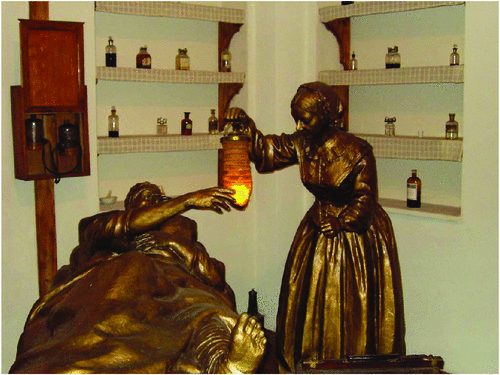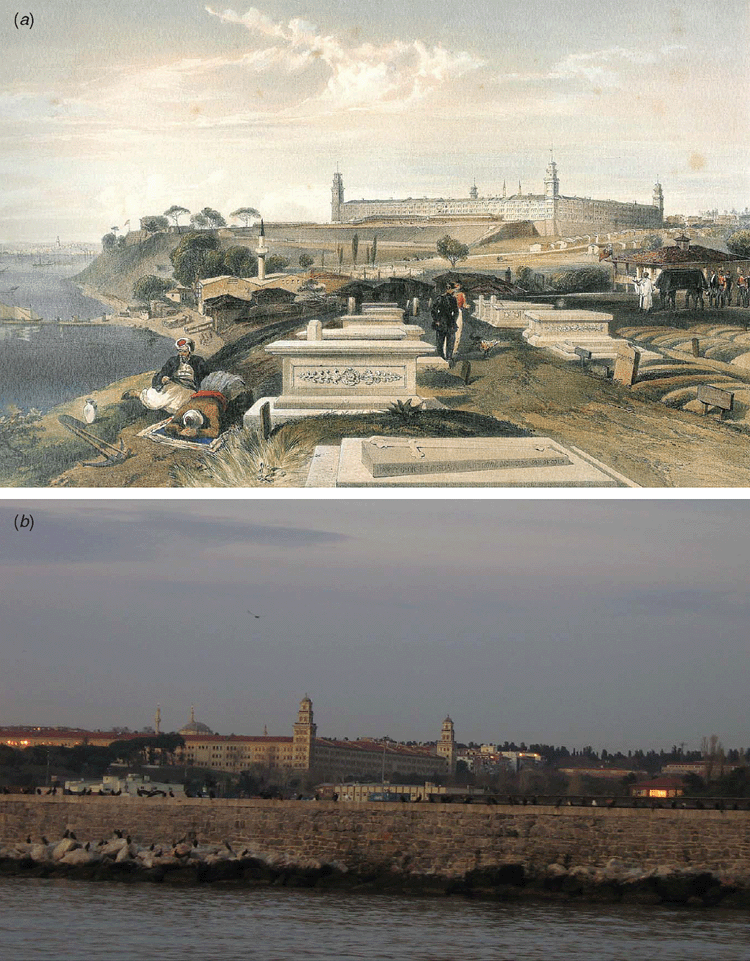Holistic approach to infection control and healing: the Florence Nightingale story
Bülent Gürlerİstanbul University, İstanbul Medical Faculty
Department of Clinical Microbiology
Çapa, İstanbul, Turkey
Email: gurlerb@netone.com.tr
Microbiology Australia 35(3) 174-176 https://doi.org/10.1071/MA14053
Published: 3 September 2014
Florence Nightingale (1820–1910), with a life devoted to the care of the sick and wounded, is the founder of modern nursing. She was named after the city ‘Florence’ in Italy where she was born. She belonged to a rich and aristocratic family in England and with the encouragement of her father she received education in mathematics, religion, history and philosophy of education, as well as the languages, Latin, German, French and Italian. Rejecting authority and religious dogmas, she became a pioneer of human rights movement, advocating holistic thinking for mankind. At a young age, she began to visit hospitals, saddened by the inadequacies in the physical structures of hospitals, poor sanitation and patient care. These visits had a profound effect shaping her future endeavours as the founder of the nursing profession. In 1851 she gained nursing training in Germany and on her return to England she started to work as a nurse in a private hospital in London.
The Crimean War and İstanbul
The turning point of her life came in 1854 when Britain entered the Crimean War (1854–1856) along with Ottoman Empire and France fighting against the Russian Empire. Constant combat during the war generated significant number of casualties who subsequently died due to a lack of doctors, nurses, healthcare workers and medical supplies. A family friend and a British Government official, Sidney Herbert, encouraged her to organise a group of nurses and other healthcare workers and travel to Crimea to give aid to the desperate, wounded soldiers.
The Selimiye Military Barracks in Üsküdar (Scutari), İstanbul were allocated to the British Army as it was on the way from Britain to Crimea. After the troops left for the front, the barracks were converted into a temporary military hospital. She arrived at Scutari in İstanbul (then the Ottoman capital) in November 1854 with a team of 38 volunteer nurses and they settled in the temporary ‘Selimiye Barracks Hospital’ (Figure 1) where up to 5000 injured were treated at peak times.
Under difficult and poor sanitary conditions, Florence Nightingale and her volunteer nurses provided excellent care for the injured, reducing the number of deaths. They worked tirelessly to improve the overall condition of the hospital as well as bed-side care including clean bandages, bedding and other supplies for the sick and wounded. She inspected the injured and sick every night with a lamp and she was then named as ‘the lady with a lamp’ (Figure 2). Florence Nightingale instituted a strict nursing timetable to insure that the soldiers were cared for and attended to on a regular basis to improve recovery which formed the basis of modern nursing practices employed since then. At the ‘Scutari Barracks’ she established fame as the pioneer of the nursing profession.

|
The Selimiye Barracks Hospital and beyond: theoretical foundations of nursing
After the war ended in 1856, she returned to England and published two books: Notes on Matters Affecting the Health, Efficiency and Hospital Administration of the British Army (1857) and Notes on Nursing/Hospitals (1859), which described her experience and innovative ideas on caring for the sick. Most of these experiences were gained at the ‘Selimiye Barracks Hospital’. In 1860, she established the first modern nursing school Nightingale Training School for Nurses at St Thomas Hospital in London. She continued to publish and placed emphasis on the importance of hygiene and care in infection control as well as on nursing as a sacred profession for women, in particular. With her books, public appearances and the spread of Nightingale Nursing School graduates, Florence Nightingale’s healthcare reforms and innovative practices spread throughout the world. She even provided advice to American nurses and healthcare workers during the American Civil War of 1861–1865.
She turned filthy military camps into clean and sanitised medical wards and transformed the military health care systems to such an extent that she was recognised by Queen Victoria who met with her to obtain views and advice for improving of military hospitals throughout the British Empire.
Florence Nightingale completely revamped and modernised the entire healthcare delivery and sanitation systems building on her experiences at the ‘Selimiye Barracks Hospital’1. Most remarkably, her background strength in mathematics led her to pioneer new techniques related to statistical data collection, analysis and display/delivery2. This was used to help improve poor medical care and unsanitary conditions of the established healthcare systems. She also implemented much innovative record keeping and impact analysis systems based on pioneering statistical techniques. She developed the Polar-Area Diagram3 to identify, plot and display the needless deaths of soldiers caused by the lack of ongoing, dedicated care, lack of sufficient food and unsanitary conditions. She also proved that statistics provided a superior means of understanding of the overall status of healthcare delivery and such data collection and analysis led to improved medical and surgical delivery. Her innovative Model Hospital Statistical Form helped hospitals to better collect and generate consistent healthcare maintenance data for use in improving healthcare delivery. She also introduced Florence Nightingale’s Environmental Theory that suggests that direct sunlight, fresh air, and cleanliness improves health. All these efforts had profound effect on the improvement of the practices and saving lives and even today studies are conducted using these approaches4. Other recent examples include inclusion of Nightingale’s primary tenets, such as building trust, self-assessment, and group leadership during study designs5.
She was the first to establish a theoretical foundation for nursing and stressed that the discipline is different from medicine and the goal of nursing is ‘to place the patient in the best possible condition for nature to act’ and the environmental adaptation remains the basis of holistic nursing care6–8.
Awards and recognitions
In 1858 she became a Fellow of the Royal Statistical Society and was made an honorary member of the American Statistical Association in 1874. She received the Royal Red Cross from Queen Victoria in 1907 and later that year at the age of 87 she became the first woman to receive Order of Merit from King Edward VII.
She also received awards of recognition from the Ottoman Sultan Abdülmecit and gained respect and recognition in Turkey. In 1961, İstanbul University established a school dedicated to nursing profession naming it after her ‘The İstanbul University Florence Nightingale School of Nursing (IUFNSON)’. The School aims to provide education ‘that can improve healthcare to its highest level and develop national standards in this field following the philosophy established by her, which is based on the belief and the principle that a holistic approach to the individual, the family and the community requires close collaboration with the other members of the health team’. The general objectives of the School are developed within six basic concepts taking foundational principles from her approaches to nursing: scientific knowledge, clinical practice, education, management, leadership, research and development of nursing.
Florence Nightingale Museum in İstanbul
The Turkish Army Barracks (Üsküdar (Scutari), İstanbul), which served as a British military base and hospital from 1854 to 1856 during the Crimean War, is where the Florence Nightingale Museum is located today. The room she occupied, her original desk where she wrote her letters while overlooking the beautiful landscape and blue marine waters of İstanbul can still be seen. They provide an insight into the woman who bettered the conditions and reduced the mortality rates of the Crimean War soldiers.
Since 1954 (1964 in Turkey), her birthday of 12 May is celebrated as the International Nurses Day (IND). Florence Nightingale’s way of thinking, beliefs and principles of nursing-related services are still valid today and they shaped the modern day nursing practices globally and in Turkey.
Acknowledgement
I thank Prof. Dr Mustafa ÖZYURT, Assistant Prof. Dr Nurettin ARDIÇ (GATA Haydarpaşa University Hospital, Department of Microbiology and Clinical Microbiology, İstanbul) for the input and information provided during the preparation of the article.
References
[1] Finch, E. (2010) Florence Nightingale: Pioneer of Facility Management. In W070-Special Track 18th CIB World Building Congress May 2010 Salford, United Kingdom (p. 132).[2] McDonald, L. (2013) Florence Nightingale, statistics and the Crimean War. J. Roy. Stat. Soc. A. Sta. (Statistics in Society) , 1–18.
| 1:CAS:528:DC%2BC3sXpsFSnurk%3D&md5=7168aee8fc4ebcd0aa6402c04aff4a6bCAS |
[3] Magnello, M.E. (2012) Victorian statistical graphics and the iconography of Florence Nightingale’s polar area graph. BSHM Bulletin. J. Brit. Soc. Hist. Math. 27, 13–37.
| Victorian statistical graphics and the iconography of Florence Nightingale’s polar area graph.Crossref | GoogleScholarGoogle Scholar |
[4] Hobday, R.A. and Dancer, S.J. (2013) Roles of sunlight and natural ventilation for controlling infection: historical and current perspectives. J. Hosp. Infect. 84, 271–282.
| Roles of sunlight and natural ventilation for controlling infection: historical and current perspectives.Crossref | GoogleScholarGoogle Scholar | 1:STN:280:DC%2BC3sjkvValsw%3D%3D&md5=bdffbaa532240fa9681ddcce5d1b93a7CAS | 23790506PubMed |
[5] Sessanna, L. (2004) Incorporating Florence Nightingale’s theory of nursing into teaching a group of preadolescent children about negative peer pressure. J. Pediatr. Nurs. 19, 225–231.
| Incorporating Florence Nightingale’s theory of nursing into teaching a group of preadolescent children about negative peer pressure.Crossref | GoogleScholarGoogle Scholar | 15185254PubMed |
[6] Light, K.M. (1997) Florence Nightingale and holistic philosophy. J. Holist. Nurs. 15, 25.
| Florence Nightingale and holistic philosophy.Crossref | GoogleScholarGoogle Scholar | 1:STN:280:DyaK2s3ptFKmsQ%3D%3D&md5=512ffc1403f071365be7927048985a27CAS | 9146193PubMed |
[7] Attewell, A. (2010) Florence Nightingale’s relevance to nurses. J. Holist. Nurs. 28, 101–106.
| Florence Nightingale’s relevance to nurses.Crossref | GoogleScholarGoogle Scholar | 20467036PubMed |
[8] Cohen, I.B. (1984) Florence Nightingale. Sci. Am. 250, 128–137.
| Florence Nightingale.Crossref | GoogleScholarGoogle Scholar | 1:STN:280:DyaL2c7ks1OjsA%3D%3D&md5=cfffedf9491c730843636eb92abe495fCAS | 6367033PubMed |
Biography
Prof. Dr Bülent Gürler graduated from İstanbul Technical University, Faculty of Chemical Engineering in 1972. He conducted post-graduate research in Göttingen and Detmold, Germany (1981–82). After his return to Turkey he was awarded a doctorate in medicine (1989) and became a full professor in 1996 at one of Turkey’s leading university hospitals; İstanbul University, Medical Faculty, Department of Microbiology and Immunology in İstanbul. His research activities have been directed to infection control, prevention of nosocomial infections, disinfection and sterilisation. He has been the founding member and the Honorary President of the Turkish Society for Disinfection, Antiseptics and Sterilization (DAS) as well as the President of the Turkish Society for Antibiotics and Chemotherapy (ANKEM). He represents Turkey at the European Culture Collections Organization (ECCO) Meetings. He is also the President of the Turkish Culture Collections (KUKENS) which is a member collection of the World Federation of Culture Collections (WFCC). KUKENS will host the 14th International Conference on Culture Collections in Antalya, Turkey in 2016.



